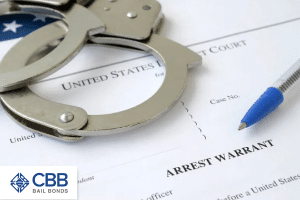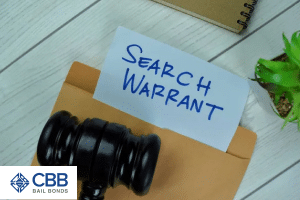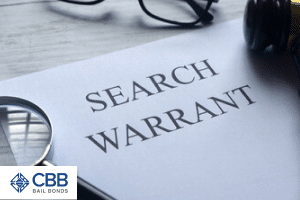
Discovering if there's a warrant for your arrest can be daunting, but it's a crucial step in proactively addressing legal issues. At CBB Bail Bonds, we believe in empowering you with the right knowledge to handle this situation. This guide will walk you through checking for arrest warrants so you can take appropriate action.
Knowing if there's an outstanding warrant against you is crucial for your peace of mind and legal well-being. Warrants can impact your life, from job opportunities to travel plans. This guide is designed to simplify the process and help you understand your options. Our aim is to provide clear, helpful information for anyone who might be facing this challenging situation.
Starting Your Warrant Search: What You Need to Know
Before you start your warrant search, it's essential to understand what an arrest warrant is. An arrest warrant is a legal document issued by a judge, giving law enforcement officers the authority to arrest someone. Warrants are typically issued when there's evidence suggesting involvement in a crime.
When conducting a warrant search, it's crucial to be thorough. Remember, arrest warrants are not always made public, and some might not be easily accessible online. It's also important to note that warrant laws can vary from state to state. This can affect how warrants are issued and how they can be searched.
Why Would a Warrant Be Issued for Your Arrest?
There are several reasons why a warrant might be issued for your arrest. The most common reason is if you're suspected of committing a crime. This could range from minor offenses to serious felonies. Other reasons include failing to appear in court, violating probation terms, or not paying fines.
Understanding the reason behind an arrest warrant is key to addressing it properly. If it's for a missed court appearance (known as a bench warrant), the solution might be as simple as rescheduling your hearing. But for more serious allegations, the approach will be different. Knowing the reason helps in planning your next steps.
Navigating Online Databases for Warrant Information

Online databases are a good starting point for a warrant search. Many states and counties have public records accessible online where you can conduct an arrest warrant search. However, not all warrants are listed online, especially for minor offenses or in smaller jurisdictions.
When using online databases, be cautious and ensure you use a reliable source. Some websites might not have updated or complete information. Also, be aware of privacy concerns when entering personal information online. If in doubt, consider other methods of conducting your warrant search.
The Role of Local Police Departments in Warrant Checks
Local police departments are a direct source of warrant information. You can visit or call your local police station to inquire about any active warrants. Remember that if there is an active arrest warrant, the police might take you to jail.
Approaching the police station can be intimidating, but remember that law enforcement officers are there to help. It's always better to be proactive and address any outstanding warrants voluntarily. This can often lead to a more favorable outcome than if you're arrested unexpectedly.
Consulting with a Criminal Defense Attorney: Legal Advice on Warrant Searches
It's smart to consult with a criminal defense attorney if you suspect there's a warrant out for your arrest. An attorney can provide legal advice specific to your situation and help you understand your rights. They can also assist in navigating the warrant search process.
A criminal defense attorney can contact law enforcement or court clerks on your behalf. This reduces the risk of being arrested during the inquiry process. They can also guide you through the steps to take if an arrest warrant is found, ensuring you handle the situation in the best possible legal way.
Can You Fight an Arrest Warrant?
Yes, you can challenge an arrest warrant, but it's a legal process that requires careful handling. If you believe an arrest warrant was issued mistakenly or unjustly, gathering evidence supporting your case is essential. A criminal defense attorney can be invaluable in this process.
Fighting an arrest warrant typically involves a court hearing. During this hearing, you or your attorney can present evidence and argue why the warrant should be dismissed. It's essential to approach this process with a clear strategy and legal representation.
Understanding Different Types of Arrest Warrants

There are different types of arrest warrants; understanding them can help you navigate your situation better. The most common are bench warrants, usually issued for failing to appear in court. Others include search warrants and felony warrants, each with specific legal implications.
Understanding the type of warrant can determine the best course of action. For example, a bench warrant might require you to simply reschedule a missed court appearance. In contrast, a felony warrant might involve a more complex legal process.
Privacy and Legal Considerations in Warrant Searches
Privacy and legal considerations are important when searching for an arrest warrant. Be cautious about sharing personal information online or with third-party services. It's also important to know your rights, especially if you approach law enforcement directly.
If you choose to visit a police station for a warrant check, be prepared for the possibility of arrest. It's a good idea to inform someone you trust about your plan and to have the contact information of a criminal defense attorney handy.
How to React if You Discover an Arrest Warrant: Steps To Take
- Don't Panic: Stay calm and take a moment to process the situation. Understanding the specifics of the warrant is crucial for the next steps.
- Read the Warrant Carefully: Pay close attention to the details in the warrant, especially the alleged offense and the issuing authority.
- Call a Criminal Defense Attorney: Reach out to a legal professional immediately for advice. An attorney can guide you on how to proceed legally and safely.
- Do Not Try to Flee: Escaping only complicates your situation and could lead to more serious charges. It's crucial to face the situation responsibly.
- Prepare to Surrender to the Police: If your attorney advises, make arrangements to turn yourself in. This should be done in a controlled and planned manner.
- Gather Relevant Documents: Collect any paperwork or evidence that might be relevant to your case. These documents can be crucial in your legal defense.
- Follow Your Attorney's Advice: Trust in the guidance of your legal counsel. They will navigate you through the legal process and represent your interests in court.
CBB Bail Bonds: Your Ally in Dealing with Arrest Warrants

At CBB Bail Bonds, we understand how stressful dealing with an arrest warrant can be. Our bail bond agents are experienced in addressing these situations and can provide guidance and support. We're here to help you through the process, from the initial warrant search to posting bail if needed.
Our services go beyond just bail bonds. We offer advice and assistance in navigating the complexities of arrest warrants and the criminal justice system. Our goal is to help you resolve your legal issues with as little stress and disruption to your life as possible.
Preventing Future Warrants: Tips and Best Practices
If there is an outstanding warrant, a law enforcement officer could arrest you at any time. This can create a whole host of problems for you. If you want to avoid having a police officer execute an active warrant for your arrest, a few tips to follow include:
- Attend All Court Appointments: It's crucial to keep track of your court dates and attend every scheduled appointment. Missing a court date can lead to the issuance of a bench warrant. Staying organized and punctual with your legal obligations can prevent unnecessary legal complications.
- Stay Informed About Legal Obligations: Understanding and adhering to any probation terms, fines, or court orders is essential. Ignorance of these obligations can inadvertently lead to violations, resulting in warrants. Regularly reviewing your legal responsibilities can help avoid these pitfalls. The court clerk can help you with this.
- Maintain Open Communication with Your Attorney: Regular communication with your lawyer is key to navigating legal challenges. Your attorney can provide updates and advice on any developments in your case. Stay in touch ensures you're always informed and prepared for legal requirements. Remember, you can get a court-appointed attorney if you cannot afford one.
- Update Your Contact Information: Keeping your contact information updated with the court and your attorney is critical. This ensures you receive all legal notifications and court correspondence. Failure to receive and respond to these can result in missed court dates and potential warrants.
- Follow the Law: Adhering to the law is fundamental to avoiding criminal charges and subsequent warrants. Understanding and respecting legal boundaries is crucial for your freedom and reputation. Staying law-abiding prevents legal issues and contributes to a safer community.
Police officers are only doing their job. At the same time, you might not know if the county court has any active arrest warrants out for you. That is where we can help you.
Contact CBB Bail Bonds for Help With a Warrant Search

If you're concerned about a possible outstanding arrest warrant, don't hesitate to contact CBB Bail Bonds. Whether you need to confirm an outstanding warrant or understand your options, we're here to help. Let CBB Bail Bonds be your first call for guidance and assistance in these challenging times. Contact us today to speak to our team.






